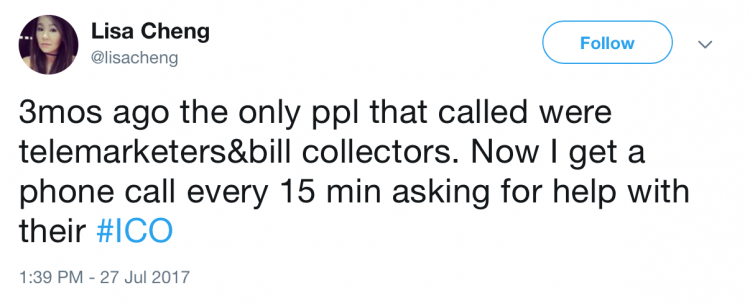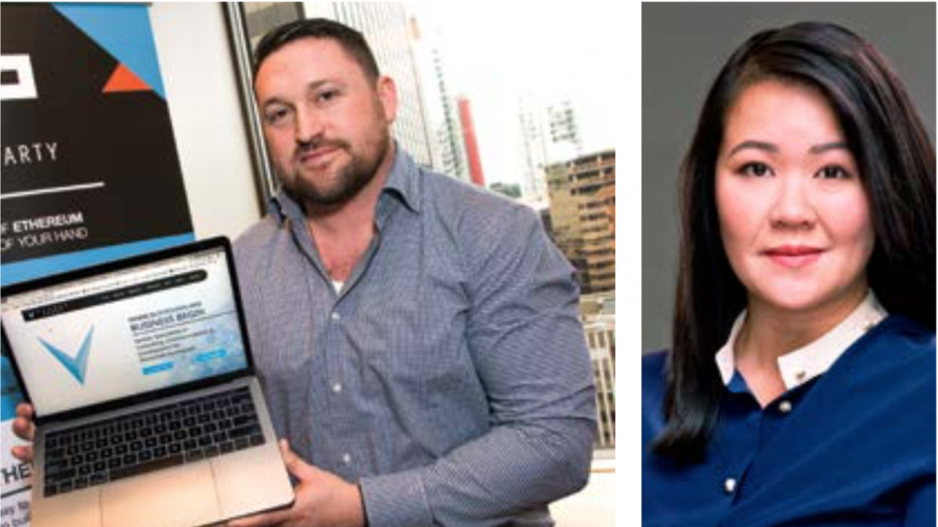Business in Vancouver takes an in-depth look at the aftermath of the record-breaking deal that made headlines when Vancouver-based Vanbex raised up to $33 million for its cryptocurrency offering. Now the principals of that firm are fending off allegations that they fraudulently used much of that money to bankroll a lavish lifestyle replete with luxury cars, high-stakes gambling and luxury real estate
“3 mos ago the only ppl that called me were telemarketers & bill collectors. Now I get a phone call every 15 min asking for help with their [cryptocurrency offering],” tweeted Lisa Cheng, founder of Vancouver-based cryptocurrency company Vanbex, in July 2017.
Cheng’s newfound fame and wealth, shared by her business partner and Vanbex CEO Kevin Hobbs, came from their company’s 2017 cryptocurrency offering, billed as Canada’s largest after the firm raised between $30 million and $33 million from the sale of its Fuel token cryptocurrency. The pair became minor celebrities within the cryptocurrency space, and Cheng was even dubbed the “Bitcoin Wonder Woman” by her peers.
However, questions surrounding the venture may have stripped Hobbs and Cheng of their superhero status, with allegations that Vanbex’s cryptocurrency sale was a multimillion-dollar fraud used to purchase luxury condos, acquire supercars and fund high-roller gambling.

Record-breaking offering
The tens of millions Vanbex raised came mostly in the form of Ether, the second most popular cryptocurrency behind Bitcoin. On October 29, 2017, at the end of Vanbex’s cryptocurrency offering, Ether was trading at approximately US$300. A few months later in early January, Ether grew by a factor of four, peaking at a value of roughly US$1,400, theoretically bringing the value of the $33 million raised to roughly $150 million at its highest.
Vanbex was able to raise millions of dollars by claiming that its Fuel token was not a tradable security like stocks, but rather a cryptocurrency that had intrinsic value because, Vanbex said, it could be used on the company’s yet-to-be-built platform, a smart contract system it referred to as Etherparty (no relation to Ether).
However, no usable platform, product or technology was ever created and there is essentially no client base, according to court documents obtained by Business in Vancouver. Since Vanbex’s Fuel token offering, the tokens have become virtually worthless, crashing in dollar value by over 90%. Court documents attribute this to the lack of intrinsic value in Fuel tokens. The director of B.C.’s Civil Forfeiture Office has even questioned whether Fuel tokens have a reason to exist, given that the company failed to produce a single usable product, let alone the smart contract platform originally promised to investors.
The claim that Vanbex has no usable product or real client base is being disputed by Vanbex’s founder and CEO, who, as a key part of the company’s defence, stated that it has indeed developed a usable product, a service called Rocket that allows users to create other tokens or cryptocurrencies.
Transactions under scrutiny
During Vanbex’s cryptocurrency offering and in the months following, US$8.9 million made its way into Hobbs’ personal bank account, according to a report by the Financial Transactions and Reports Analysis Centre of Canada submitted in an RCMP affidavit. Over a period of eight months, there were 18 transactions averaging US$495,000 each. The largest transfer was for US$2 million on December 4, 2018.
Shortly after the offering, Hobbs’ and Cheng’s Instagram accounts became littered with posts of their newfound fortune and lavish lifestyle, including trips on private planes and yacht excursions among other indulgences. They flaunted luxury goods, six-figure Rolex collections and private box seats at Rogers Arena and Toronto’s Scotiabank Arena.
On March 14, however, BC Supreme Court granted the director of civil forfeiture an interim order to seize the personal assets of Cheng and Hobbs, including real estate and vehicles. Court documents allege that Cheng and Hobbs misappropriated the money raised through the cryptocurrency offering to purchase multimillion-dollar properties in Vancouver and Toronto at roughly $4 million each.
The money was also allegedly used to lease a blue Lamborghini valued at $500,000, acquire two Range Rovers that have a combined blue book value of $225,000 and obtain other personal goods and benefits.
Hobbs also allegedly used misappropriated money to play as a “high roller” at some of Metro Vancouver’s most prominent casinos, including Parq Vancouver and the now defunct Edgewater Casino. In 2017, Hobbs was placed on the BC Lottery Corp.’s watch list after receiving disbursements totalling between $1.8 million and $2.3 million from B.C. casinos between September 2016 and May 2018. Many of the disbursements coincided with when money started rolling in from the cryptocurrency offering. Hobbs also wired $500,000 to the Atlantis casino in the Bahamas to play in a high rollers’ poker tournament with a $100,000 buy-in.

Hobbs in an Atlantis poker tournament, photo from Poker Stars Blog and submitted in a court affidavit.
After Vanbex’s cryptocurrency offering, Hobbs began depositing tens of thousands of dollars into his gambling account held at the Parq casino each visit, and he deposited over $590,000 into the account over the following seven months, according to court documents. Hobbs testified that he made this money gambling professionally.
The Civil Forfeiture Office moved to seize the assets two weeks after nearly $1 million was withdrawn from Hobbs’ personal bank account and the Vancouver property was being listed for sale at $7.9 million.

Vancouver condo
Cheng and Hobbs took the Civil Forfeiture Office to court in an attempt to overturn the interim preservation order and have their assets returned. They lost, according to a ruling released June 24. The presiding judge issued an aggressive 30-point order confirming that the assets will remain frozen pending the outcome of a final trial.
Cheng and Hobbs remain hopeful that they will win at trial, according to press releases and public internet chat logs, though they omitted their most recent loss to the Civil Forfeiture Office in all their communications and updates.
Both Cheng and Hobbs denied accusations of misappropriation in statements to Business in Vancouver, and said claims, which they maintain are false, made by a former employee are responsible for the civil suit and investigations. They are also fighting the forfeiture office’s claims in court.
“The suit wrongly claims our business is a fraud,” said Cheng in an email exchange. “The claim is false as our employees, customers and investors are all aware. Our staff have been encouraged to co-operate fully with the investigation and they are.”
In their written response to the forfeiture office, Cheng and Hobbs claim to have raised only $24 million rather than the $33 million announced in earlier press releases. This difference is approximately the same amount that the Civil Forfeiture Office is alleging was taken from the company. An affidavit from the company’s former CFO asserts that there was at least US$8 million missing from the company’s accounts.
In court, the judge said Cheng and Hobbs were noticeably silent on where their sudden wealth came from.
In an interview with Business in Vancouver, Hobbs said that they had obtained money legitimately before the cryptocurrency offering.
“It will all be shown that [the money] was legally obtained,” Hobbs said. “We had cryptocurrency long before we raised any money. I had money long before we raised any money.”
Hobbs claims that he was a successful gambler and that the two had money before the cryptocurrency offering. However, there were no signs of conspicuous wealth in their lifestyle preceding the cryptocurrency offering. They were living with Cheng’s parents and did not own any vehicles or property. In addition, before the cryptocurrency offering, Vanbex held a fundraising round to raise $500,000 in equity.
On his company’s public message board, Hobbs also denied ever having the Lamborghini. Those denials continued into his court submissions.
“There are no ‘Ferraris’ or ‘houses,’” Hobbs said in a court affidavit.
Yet Hobbs and Cheng appear to have enjoyed multiple different models of luxury vehicles, including a Lamborghini and multimillion-dollar condos rather than houses. •
Answering the allegations
A main part of Cheng’s and Hobbs’s defence in the civil forfeiture case relies on rebutting the claim that Vanbex has no usable products and no real client base. Cheng and Hobbs point to their token creator Rocket as their usable product and say that they have clients for their cryptocurrency consulting business.
But while Rocket is a token creator, it is far from the smart contract platform touted in the company’s original pitch to investors. Token creators are a very basic blockchain technology. There are several token creators available online for free online that have been built without tens of millions of dollars in startup funding and that were faster to market than Rocket. The director has even questioned whether the two ever intended to build the product they had proposed in their white paper.
The Civil Forfeiture Office, however, has made clear that the biggest concern is the sudden substantial wealth the pair acquired contemporaneously with their company’s cryptocurrency offering.
Another pillar of the defence involves claiming that Vanbex’s former director of engineering, Kip Warner,is defaming the company as well as its principals and should be discredited as a witness. Cheng and Hobbs have filed a defamation lawsuit against Warner for what he said to RCMP officials. However, new affidavits filed on behalf of the director of civil forfeiture deny relying on Warner’s testimony to build its case.
Warner and Hobbs both have a litigious past. Warner previously sued Hobbs for failure to pay for services rendered. The judge sided with Warner and he was awarded over $2,000, but less than the $7,000 judgment he was seeking. Hobbs has a current suit against Warner, and his recent attempts to withdraw the suit have failed because he needs Warner’s permission to do so.
Cheng and Hobbs are defendants in a number of civil suits, and the Civil Forfeiture Office isn’t the only organization looking into Vanbex. According to court documents, the RCMP’s Federal Serious and Organized Crime division has since May 2018 been investigating the company and the $33 million dollars raised, and for over a year now, the BC Securities Commission (BCSC) has been investigating the company and its principals.
In addition to the provincial security commissions, the Canada Revenue Agency (CRA) has also been questioning Cheng and Hobbs and has an active investigation into the pair for alleged failure to declare taxable income.Since Vanbex’s founding in 2017, the company or its principals have been investigated by at least six agencies including the BC Lottery Corp., Fintrac and the Civil Forfeiture Office.
The Civil Forfeiture Office is pursuing its claim primarily on the basis that Vanbex allegedly misappropriated money raised from the sale of its cryptocurrency for the purposes of funding the lavish personal life style of its executives. However, very few FUEL tokens purchasers have come forward in the case. Mathew Good, a lawyer with Good Barrister, has been working to put together a class action lawsuit against Vanbex but is having difficulty finding investors from British Columbia to start the suit. Hobbs argues this difficulty is evidence for his innocence, saying that the fraud allegations are being made by ex-employees with an axe to grind rather than harmed investors. However, the reason investors may have yet to come forward could be because that many cryptocurrency investors were small retail investors often making purchases of less than $1000.
Cryptocurrency boom and bust
With Canada’s largest cryptocurrency sale facing fraud allegations and major cryptocurrency indices having lost 75% of their value, leaving scores of devastated investors – one report prepared by the cryptocurrency advisory firm Statis Group puts the percentage of 2017 cryptocurrency sales exposed as scams at 80% – the outlook for these digital assets seems abysmal.
But what had allowed cryptocurrencies to rise so fast in the first place before their steep fall?
One of the problems was that the law was not ready for cryptocurrencies. A regulatory environment capable of monitoring the emerging technology simply did not exist.
In particular, the BCSC had not yet stated that cryptocurrencies were securities. This created an opportunity for companies, like Vanbex, to sell cryptocurrencies by claiming they were not subject to the regulations governing securities.
In a late 2017 interview with Business in Vancouver, Hobbs said that he was working with BCSC to classify Vanbex’s FUEL cryptocurrency as a utility, which would keep it permanently out of reach of securities regulators. This was a claim he would later repeat in court filings as evidence that Vanbex was compliant with all BCSC regulations. While Vanbex was in talks with the securities commission, a letter from the BCSC filed in court by the Civil Forfeiture Office reveals that those talks were unsuccessful, and that the BCSC considered the cryptocurrency a security and subject to securities regulations.
Before then, without the proper regulatory framework in place, Vanbex was able operate freely and expand its client base. After Vanbex’s cryptocurrency offering, the company became prominent within the cryptocurrency community both locally and globally, being lauded in the sector’s press and blogosphere. That publicity was then parlayed into new contracts.
The number of clients Vanbex had is being debated in the courtroom. In affidavits, the Civil Forfeiture Office claims that Vanbex had only two clients at the time and developed no usable products. Vanbex has claimed to have upwards of 50 clients and cites its claim to having created the Rocket blockchain product.
Legal action
Two clients, StoAmigo and Elev3n, have sued Vanbex, claiming it failed to provide products and services that had been paid for.
Those lawsuits stem from Vanbex’s capacity, outside its role as a cryptocurrency creator, as a consulting firm to other companies looking to enter the cryptocurrency space. Philadelphia-based Elev3nhad contracted Vanbex to take the technical lead on its own coin offering for its health care platform and develop the required technology. Elev3n alleges it was never delivered, and sued Vanbex in the United States.
The U.S. company also claims sought an injunction to stop Vanbex’s cryptocurrency offering, alleging that Vanbex was using Elev3n’s copyrighted material to conduct its own offering.
In court documents, Elev3n claimed Vanbex continued to access Elev3n’s copyrighted material, which it allegedly used to develop its own platform and cryptocurrency that would later be the centre of a $33 million fraud allegation. Hobbs denied that this claim, saying that while folders in a Google Drive were viewed, none of the actual files were looked at. Hobbs added that someone who was not employed by the company viewed the files.
Elev3n claimed that Hobbs had made many misrepresentations to them, which included having an MBA and bachelor degrees from both Dalhousie University and Douglas College, a claim once mirrored on Hobbs’ LinkedIn profile. Letters from the registrars of both institutions confirm Hobbs attended but never graduated.
According to testimony by Vanbex’s former director of engineering, Kip Warner, Elev3n was the only client Vanbex had during Warner’s time there. He said he would have been the one tasked with developing the technology. However, he said, the company had very little in terms of productive assets and most of the money was spent on public promotion according to testimony Warner gave.
“As the director of engineering, I had no engineers to direct,” said Warner in court documents. “I did not have a workstation, [there] were no engineering schematics, working notes, source code, build environment, executable programs, object code, formulae, algorithms, data structures, or other materials essential to the actual functionality of the underlying technology.”
Without the proper software infrastructure, how did Vanbex deliver on contracts it had with other tech companies to develop digital platforms or launch new cryptocurrencies?
Multiple court documents and lawsuits allege that they simply did not.
Elev3n’s lawsuit was settled out of court
Alleged market manipulation
According to a report from the RCMP’s Federal Serious and Organized Crime Division, Vanbex manipulated the price of Vanbex’s FUEL token by buying and selling volume. According to the affidavits, one of Vanbex’s employees was assigned the role of “market maker.” According to the report, the job description was to manipulate prices and time media strategies to create hype for its token.
Some clients would pay Vanbex using their own cryptocurrencies. This provided an opportunity for Vanbex to increase its return from the client, with efforts to raise the value of the respective cryptocurrency. If the cryptocurrency’s value increased, the company could sell it for a profit.
In the case of one company, Spells of Genesis, and its cryptocurrency, BitCrystals, the token’s value unexpectedly jumped to a record high at the end of August 2016. In a blog post, Vanbex’s former director of marketing and communication, Brandon Kostinuk, wrote that it was difficult to determine the cause of the climb but chalked it up to it nearing product launch. However, private chat logs obtained by Business in Vancouver show Vanbex employees and Hobbs taking credit for inflating the value.
At one point, Hobbs complained that someone was working against his efforts to boost the value of the BitCrystal token. Hobbs denies ever trying to artificially boost the trade volume or price of any security or engaging in so-called pump and dump schemes. In the interview with BIV, he also denied ever using bots for this purpose or ever complaining that other people’s cryptocurrency trading activity was thwarting his attempts to raise the value.
Cheng and Hobbs deny all current claims of criminality and wrongdoing, allegations that Vanbex is a fraudulent company and allegations that they misappropriated money.





